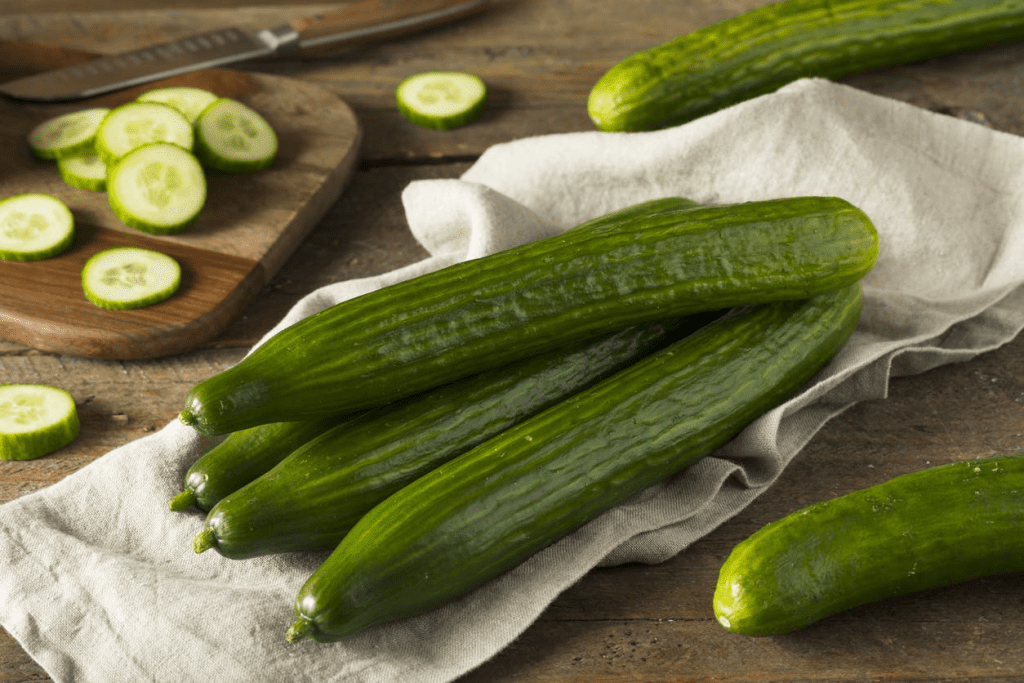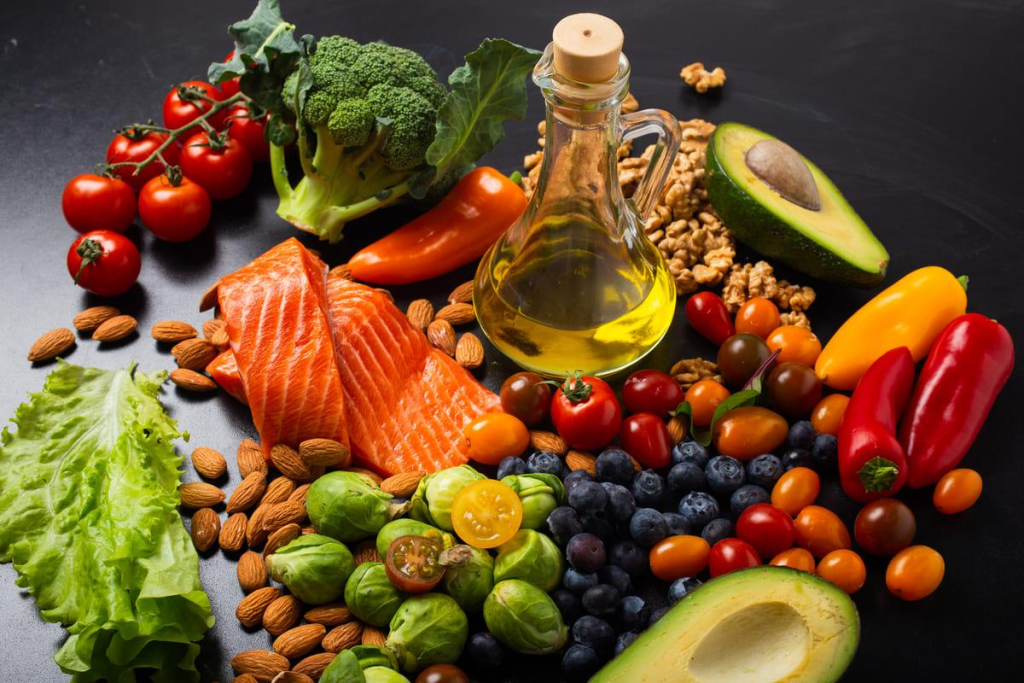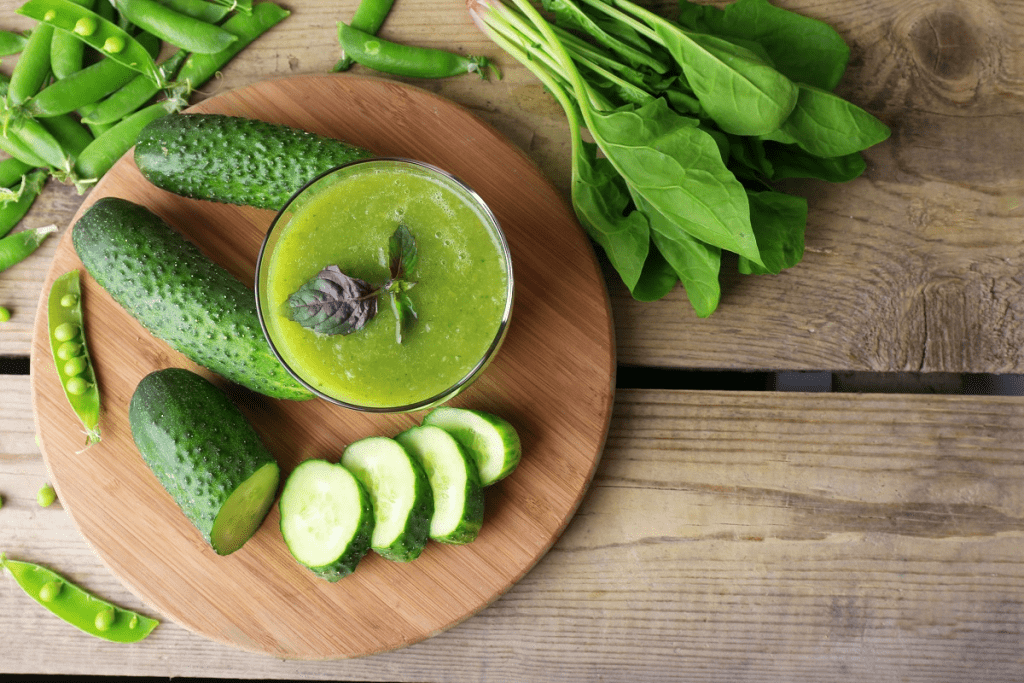Last Updated on November 24, 2025 by
We often enjoy cucumbers as a refreshing snack, but are cucumbers good for you beyond their crisp texture? With a high-water composition ” about 96% water content according to nutrition databases ” cucumbers are one of the most hydrating foods you can eat and help support fluid balance and basic bodily functions (see USDA nutrient data).

Cucumbers are low in calories and provide modest amounts of key nutrients: small amounts of vitamin C and vitamin K, plus potassium and magnesium ” making them a useful addition to a balanced diet. Cucumbers also contribute fiber and hydration with few calories, which is why many people consider them a healthy fruit (botanically) or vegetable choice.
Cucumbers are refreshing and low in calories, making them an easy way to add water and some nutrients to your plate. Below is a clear, consistent look at what a typical medium cucumber provides so you can compare servings and plan meals.
Per medium cucumber (about 300 g): roughly 45 calories. Cucumbers are mostly water and contain small amounts of macronutrients ” roughly 2 g of protein and 11 g of total carbohydrates per medium fruit, including about 1.5“2 g of fiber depending on whether the peel is included. That low net-carb and low-calorie profile makes cucumbers useful for people watching calories or carbohydrate intake.

Cucumbers contain modest but useful amounts of vitamins and minerals. A medium cucumber typically provides small amounts of vitamin C and about 40“50 mcg of vitamin K, which plays a role in blood clotting and bone health. Cucumbers also supply potassium and magnesium in modest amounts ” helpful additions to overall electrolyte and mineral intake, especially when combined with other nutrient-dense foods.
Most of the fiber in cucumbers is in the peel, which is why leaving the skin on increases fiber content. With about 1.5 g of fiber per medium cucumber (up to ~2 g with skin), cucumbers contribute to daily fiber goals. Dietary fiber supports digestion, promotes satiety, and can help stabilize blood sugar when eaten as part of balanced meals.
In short, cucumbers are a low-calorie, high-water plant food that provides hydration, small amounts of vitamins and minerals, and some fiber ” a simple way to boost nutrient variety in a healthy diet.
Cucumbers are exceptionally hydrating ” roughly 96% water ” which makes them a practical, low-calorie way to support daily fluid needs and overall health (see USDA nutrient data).
Because cucumbers are mostly water, they can help maintain proper fluid balance and support functions in the body such as muscle performance and joint lubrication. Eating hydrating foods like cucumbers is a helpful complement to drinking fluids, especially when you want extra hydration from whole foods.
How cucumber hydration may support the body:
Drinking enough water is important for skin health, and hydrating foods may help support that effect. Cucumbers also contain antioxidants that can help protect skin cells from oxidative damage, so they may contribute to healthier-looking skin as part of a balanced diet ” but they are not a replacement for good skin care or medical treatments.

When we look at the research, cucumbers appear to offer several healthful components beyond basic hydration. While not a miracle food, cucumbers contain nutrients and plant compounds that preliminary studies suggest may help support aspects of health when eaten as part of a balanced diet.
Some laboratory and animal studies have examined cucumber compounds and found potential benefits ” for example, effects on inflammation and markers of metabolism. Human research is more limited, so claims should be framed cautiously: cucumbers may contribute modestly to blood sugar control, inflammation reduction, and overall nutrient intake, but larger clinical trials are needed to confirm direct therapeutic effects.
Cucurbitacins and Their Effects
Note: the above findings are mostly from in vitro or animal research; human studies are sparse, so these results should not be interpreted as clinical proof. Add citations to recent reviews or PubMed summaries when publishing the final article to clarify evidence levels.
Nutrition experts commonly recommend cucumbers as a low-calorie, hydrating food that can help increase vegetable intake and dietary variety. As part of an overall healthy eating pattern, cucumbers contribute water, some fiber, vitamins, and antioxidants ” all factors that support general well-being.
“Cucumbers are an easy, low-calorie way to add hydration and some micronutrients to meals; they complement other vegetables in a balanced diet.” ” A registered dietitian highlights.
In short, research suggests cucumbers have plant compounds with promising biological activities, but cucumbers should be viewed as a nutritious component of a varied diet rather than a standalone treatment for health conditions.
Cucumbers contain several antioxidant compounds that contribute to their health profile. The most notable are flavonoids and tannins, plant-based molecules that help protect cells from oxidative damage and inflammation.
Flavonoids in cucumbers are associated with anti-inflammatory and antioxidant actions in laboratory studies, while tannins have demonstrated antimicrobial and free-radical“scavenging activity in vitro. Most of these compounds are concentrated in the peel, so leaving the skin on increases antioxidant intake.
Oxidative stress occurs when reactive oxygen species (ROS) outnumber the body’s antioxidants. Antioxidants help neutralize ROS and protect cellular components. In practical terms, antioxidants from foods like cucumbers can:
Observational research links higher fruit and vegetable intake with a lower risk of chronic conditions such as heart disease, and antioxidant-rich foods likely contribute to that effect. However, evidence that cucumbers alone prevent disease is limited: current studies are mostly observational or preclinical, so cucumbers may help boost antioxidant intake and support long-term health when eaten as part of a varied diet.
“A diet rich in fruits and vegetables is associated with a lower risk of chronic diseases.”
Including cucumbers with other antioxidant-rich foods is an easy way to help reduce oxidative stress and support overall health.
Cucumbers combine water and modest fiber, which together can support healthy digestion. Below we explain how these components help keep the digestive system functioning and when to seek medical advice.
Most of the fiber in a cucumber is in the skin, so eating the peel increases its fiber contribution. A medium cucumber provides about 1.5“2 g of fiber, a mix of soluble and insoluble types; that fiber helps bulk stool, support regular bowel movements, and feed beneficial gut bacteria.
Practical digestive benefits of fiber-rich, hydrating foods like cucumbers:
Water is essential for digestion: it softens stool, helps dissolve nutrients and fiber, and supports smooth transit through the gastrointestinal tract. Because cucumbers are roughly 96% water, they can contribute to daily fluid intake and complement drinking water in maintaining digestive comfort.
If you have persistent digestive problems”severe abdominal pain, ongoing diarrhea, constipation that won’t improve, or blood in stool”talk to your healthcare provider before relying on dietary changes alone. In many cases, adding cucumbers as part of a balanced, fiber-rich diet is a safe, low-cost way to support digestive health.
Cucumbers are a helpful food for people focused on weight control because they deliver volume and hydration with very few calories. Their combination of high water and modest fiber helps you feel fuller without adding many calories, making cucumbers an easy addition to weight loss diets.
A cup of sliced cucumber contains roughly 16 calories, so you can add bulk to meals and snacks without a big calorie hit. That low-energy density makes cucumbers useful for overall weight management and for increasing meal volume when you want to reduce total calorie intake.
Key benefits of low-calorie, high-volume foods like cucumbers:
Because cucumbers are mostly water and contain some fiber, they help with short-term satiety. Water-rich foods slow eating and add volume, while fiber (especially when the peel is left on) slows digestion a bit, which can help curb hunger between meals. Research supports the idea that high-water, high-fiber foods improve fullness compared with energy-dense options.
Adding cucumbers to a calorie-controlled plan is easy and versatile. Try these simple uses:
Small changes like these”swapping energy-dense sides for cucumber additions”can help reduce daily calorie intake while keeping meals satisfying and hydrating.
Some early research suggests cucumbers contain compounds and nutrients that may help support healthy blood sugar levels, but the evidence is limited and mostly preliminary.
Cucumbers contain plant compounds called cucurbitacins that have shown biological activity in laboratory and animal studies ” including anti-inflammatory effects and potential impacts on glucose metabolism. These findings are promising, but human clinical trials are sparse, so cucumbers should not be considered a treatment for diabetes.
The fiber in cucumbers slows digestion and can reduce the speed of carbohydrate absorption when eaten with other foods, which helps blunt post-meal blood glucose spikes. As part of a balanced meal, cucumbers’ water and fiber content can be a useful, low-calorie way to help manage blood sugar levels.
If you have diabetes or type 2 diabetes risk, discuss dietary changes with your healthcare provider ” cucumbers can be a supportive food choice for many people, but they are not a substitute for medical treatment or individualized diabetes care.
Cucumbers are a simple, refreshing way to add hydration and small amounts of nutrients to meals. They’re versatile, low-calorie, and easy to include in many dishes ” a convenient food addition for anyone looking to boost vegetable variety and hydration.
Try these quick ideas to use cucumbers in salads, sandwiches, smoothies, and snacks:
For more ideas, see Healthline’s article on cucumbers, which includes additional recipes and serving suggestions.
Follow these do’s and don’ts to keep cucumbers fresh and tasty:
Choosing organic or conventional depends on budget and personal preference. Organic cucumbers are grown without synthetic pesticides, which can reduce chemical exposure; conventional cucumbers are often less expensive and still provide the same basic nutrition. Both types are nutritious ” the key is to include cucumbers regularly as part of a balanced diet.
Whether you add sliced cucumbers to a salad, use them in sandwiches, or try quick pickling, cucumbers are an easy, hydrating way to expand your meal variety and enjoy the health benefits cucumbers offer.
Eating cucumbers is generally safe and healthy for most people, but a few considerations can help you enjoy them with confidence.
Cucumber allergies are uncommon but can occur. Symptoms may include itching, swelling, or breathing difficulties after eating raw cucumber. People with allergies to members of the Cucurbitaceae family (which includes squash, melons, and pumpkins) may be more likely to react and should avoid cucumbers if they have known cross‘reactive allergies. If you experience severe symptoms, seek medical help right away.
Some conventionally grown cucumbers can have surface pesticide residues. There are simple, effective steps to reduce exposure:
Ranked by effectiveness: choosing organic > peeling > thorough washing.
Balancing the modest risks with the many benefits of cucumbers (hydration, low calories, fiber, and some micronutrients) is reasonable for most people. If you have specific health conditions, a history of allergic reactions, or concerns about pesticide exposure, talk with your healthcare provider for personalized advice.
Cucumbers are a low-calorie, high-water fruit/vegetable that offer simple health benefits”notably hydration, a small boost in antioxidants, and some fiber that supports digestion. When eaten as part of a balanced diet, cucumbers can complement other nutrient-dense foods to support overall health.
They are easy to use: add sliced cucumbers to a salad, use them in sandwiches, infuse water with cucumber slices, or enjoy a quick yogurt-and-cucumber dip. These small ways to increase cucumber intake add variety to meals and help with hydration and modest calorie control.
Practical recommendation: try adding one cup of sliced cucumber (about 16“45 calories depending on serving size) to your daily meals for a week and notice how it affects fullness and hydration. For people with specific health concerns”especially blood sugar or digestive conditions”consult your healthcare provider to tailor dietary choices.
Overall, the benefits of cucumbers are best realized as part of a varied, balanced eating pattern. Including cucumbers regularly is a simple, refreshing way to boost hydration and nutrient variety in your diet.
Cucumbers provide small but useful amounts of several nutrients, including vitamin K and vitamin C, plus potassium and magnesium. They’re not a dense source of all vitamins, but as a low-calorie, hydrating plant food they complement other vegetables in a balanced diet.
Cucumbers are about 96% water, so eating them contributes to daily fluid intake. As hydrating foods, they can complement drinking water and help maintain fluid balance in the body.
Yes”cucumbers are very low in calories but high in volume and water, which can increase feelings of fullness. When used as part of a calorie-controlled diet, cucumbers are a helpful, low-energy-density option for weight loss diets.
Cucumbers supply modest fiber (mostly in the skin) and water, both of which support regular bowel movements and healthy gut function. They can help with stool consistency and feed beneficial gut bacteria as part of a fiber-rich diet.
Cucumbers may help blunt post-meal blood glucose spikes when eaten with other foods because of their water and fiber content. Some plant compounds (cucurbitacins) show promise in preclinical research, but human evidence is limited”people with diabetes should consult their healthcare provider before making dietary changes for glucose control.
Enjoy cucumbers in salads, use slices as a low-calorie base for toppings, add them to smoothies for extra hydration, or try quick pickles. Simple recipes (e.g., cucumber with yogurt, mint, and lemon) make cucumbers an easy addition to meals and snacks.
Cucumbers are usually safe, but allergies or sensitivities can occur”especially in people with known allergies to other members of the Cucurbitaceae family (squash, melons). To reduce pesticide exposure, wash produce well, consider peeling, or buy organic when possible.
Cucumbers contain antioxidants such as flavonoids and tannins, mainly concentrated in the skin. Antioxidants help combat oxidative stress at the cellular level; while cucumbers alone won’t prevent disease, they contribute to a dietary pattern linked with a lower risk of chronic conditions like heart disease.
Their high water content helps with hydration, which supports skin turgor and appearance. Combined with antioxidants, cucumbers may contribute to healthier-looking skin as part of an overall skin-friendly diet”but they’re not a substitute for dermatologic care.
Yes. Because cucumbers are low in calories and provide water and some fiber, they’re a filling, nutritious choice for weight loss diets and can help add volume to meals without many extra calories.
Subscribe to our e-newsletter to stay informed about the latest innovations in the world of health and exclusive offers!